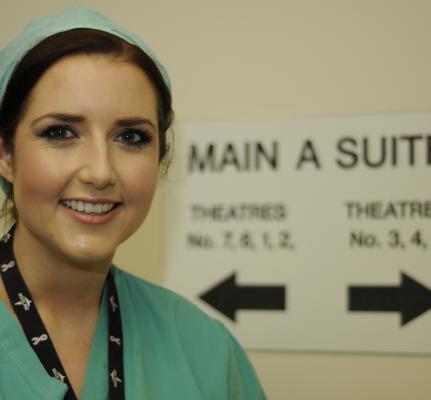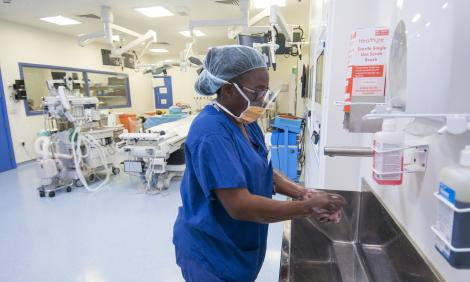Surgical care practitioner
Surgical care practitioners are members of the surgery team within the NHS. You'll support surgeons and other healthcare professionals before, during and after surgical procedures.
You'll work in an operating theatre, on wards and in clinics. You'll be trained to undertake some surgical procedures under appropriate supervision.
Working life
You'll be a healthcare professional, such as a theatre nurse or operating department practitioner, who has received further training. You'll be trained to undertake a range of tasks in surgery under the direct supervision of surgeon including:
- managing clinics where you would see patients before surgery including ensuring they are placed on surgery lists
- assessing patients to ensure they are clinically fit and healthy for the surgery
- preparing patients for surgery including venepuncture and catheterisation
- surgical procedures under direct supervision of a surgeon such as wound closure, harvesting veins and carpel tunnel surgery,
- supporting a supervising surgeon as as a first or second assistant
- daily ward rounds, making assessments and formulating plans for patients’ post-operative care
- writing of operation notes and ward round note taking
- care after the surgery eg wound assessment, treatment and identification of surgical problems and complications
- provision of support to on-call and emergency services
- evaluating a patient's condition, including the discharge process and follow-up care arrangements
- training of trainee surgeons
- prescribing appropriate medications
Sara Dalby
Surgical care practitioner
Real-life story - Sara DalbyThis is an exceptionally rewarding role. It’s allowed me to develop professionally

Pay and benefits
You'll work standard hours of around 37.5 a week. While training, you'll be paid at band 6 of NHS terms and conditions and at band 7 after qualifying. You'll be able to work flexibily which may mean working evenings, nights and weekends.
Entry requirements
Universities will decide on their own specific academic requirements but the minimum entry requirements to a recognised training programme are:
- evidence of an ability to study at Level 7 or above eg at Master’s level
- qualified and registered healthcare professional eg nurse or operating department practitioner
- evidence of at least 18 months post registration experience
Accreditation of prior experiential learning will be dependent upon the local Higher Education Institution requirements.
Must-have skills
- commitment to patient care and patient safety
- understanding of a multidisciplinary team especially with respect to the changing role of surgery
- recognition of the role and responsibilities of being a trainee surgical care practitioner
- understanding of the training programme
- an aptitude for both clinical and operative practice
- recognition that educational as well as clinical development will be required.
Where the role can lead
After completing your training, you'll be expecting to maintain and extend your knowledge, skills and competence as defined by the Royal College of Surgeons. You can also join a managed voluntary register to demonstrate you're appropriately qualified and working to the standards expected by the Royal College.
It's a dynamic speciality with several areas that the role can expand and extend into. With further training and/or experience, you may be able to apply for roles in specialist surgical teams, clinical management or make the move into education or research.
-
Surgical Services Administrator
Liverpool, L36 6EB
- Salary :
- Negotiable
- Type :
- Permanent
- Employer :
- Longview Medical Centre
-
GPwER - Surgical Specialities
Birmingham, B16 8PE
- Salary :
- £10750.00
- Type :
- Permanent
- Employer :
- Modality LLP
-
Advanced Surgical Practitioner
Midddlesbrough, TS4 3BW
- Salary :
- £55690.00 to £62682.00
- Type :
- Permanent
- Employer :
- South Tees Hospitals NHS Foundation Trust
-
Surgical Care Navigator
Prescot, L35 5DR
- Salary :
- £27485.00 to £30162.00
- Type :
- Fixed-Term
- Employer :
- Mersey and West Lancashire Teaching Hospitals NHS Trust
-
Student Surgical Care Practitioner
Leicester, LE39QP
- Salary :
- £38682.00 to £46580.00
- Type :
- Permanent
- Employer :
- University Hospitals of Leicester NHS Trust
-
Lead Cardiac Surgical Care Practitioner
London, SW17 0QT
- Salary :
- £72921.00 to £83362.00
- Type :
- Permanent
- Employer :
- St George's University Hospitals NHS Foundation Trust
-
Ward Clerk - Surgical Assessment Unit
Plymouth, PL6 8DH
- Salary :
- £24465.00
- Type :
- Permanent
- Employer :
- University Hospitals Plymouth NHS Trust
-
Deputy Sister Children's Surgical Day case
Nottingham, NG7 2UH
- Salary :
- £38682.00 to £46580.00
- Type :
- Secondment
- Employer :
- Nottingham University Hospitals NHS Trusts
-
Ward Manager - Elective Surgical Hub/Day Surgery
Whitehaven, CA28 8JG
- Salary :
- £47810.00 to £54710.00
- Type :
- Permanent
- Employer :
- North Cumbria Integrated Care NHS Foundation Trust
-
Health Care Support Worker - Surgical High Care
Newport, NP20 2UB
- Salary :
- £24833.00
- Type :
- Permanent
- Employer :
- Aneurin Bevan University Health Board
Showing 6 of 10 results





